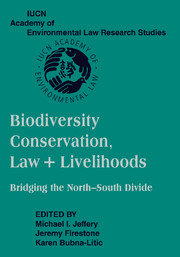 Biodiversity Conservation, Law and Livelihoods: Bridging the North-South Divide
Biodiversity Conservation, Law and Livelihoods: Bridging the North-South Divide Published online by Cambridge University Press: 31 July 2009
INTRODUCTION
Unguided (unregulated) individual and collective use of natural resources has threatened the sustainability of the environment and biodiversity. Intensive use of resources has been encouraged by policies and strategies primarily concerned with enhancing growth rates and economic development and many countries have benefited from the conversion of natural ecosystems to human-dominated ones and the exploitation of biodiversity. However, such policies have been neither efficient nor equitable in addressing poverty and its manifestations, and have resulted in unequal development between the North and the South, as well as within nation-states. Furthermore, the continued erosion of the resource base, on which development depends, proceeds unabated. With an increasing population in the midst of poverty, urbanization, and industrialization, the path to development for the South is beset by powerful drivers causing and contributing to the persistence of major environmental issues. The poor often depend directly on natural resources and functioning ecosystem services for their livelihoods. At the same time, they are particularly vulnerable to environmental hazards, such as floods, droughts, and landslides. Poverty-environment linkages need to be addressed in efforts to eradicate this situation and effective conservation and use of biodiversity cannot avoid this.
Improving environmental governance to create an enabling environment for resolving poverty-environment concerns and enhancing the asset base of the poor can expand sustainable livelihoods and reduce vulnerability.
To save this book to your Kindle, first ensure [email protected] is added to your Approved Personal Document E-mail List under your Personal Document Settings on the Manage Your Content and Devices page of your Amazon account. Then enter the ‘name’ part of your Kindle email address below. Find out more about saving to your Kindle.
Note you can select to save to either the @free.kindle.com or @kindle.com variations. ‘@free.kindle.com’ emails are free but can only be saved to your device when it is connected to wi-fi. ‘@kindle.com’ emails can be delivered even when you are not connected to wi-fi, but note that service fees apply.
Find out more about the Kindle Personal Document Service.
To save content items to your account, please confirm that you agree to abide by our usage policies. If this is the first time you use this feature, you will be asked to authorise Cambridge Core to connect with your account. Find out more about saving content to Dropbox.
To save content items to your account, please confirm that you agree to abide by our usage policies. If this is the first time you use this feature, you will be asked to authorise Cambridge Core to connect with your account. Find out more about saving content to Google Drive.